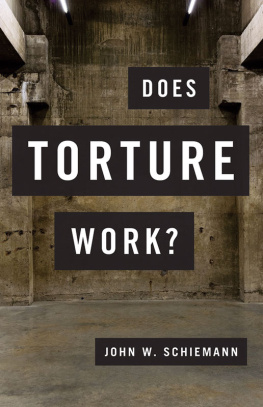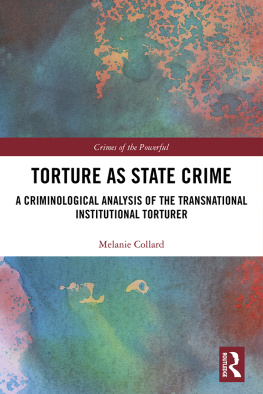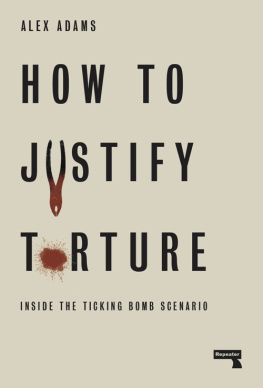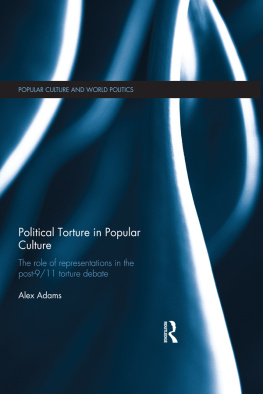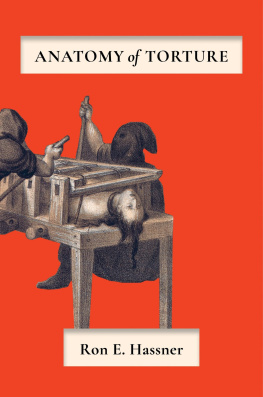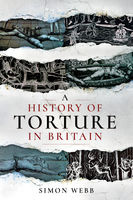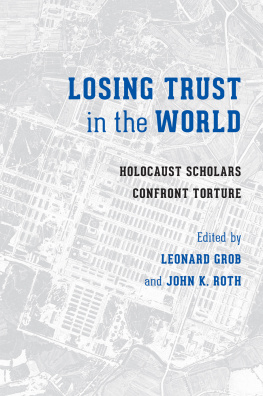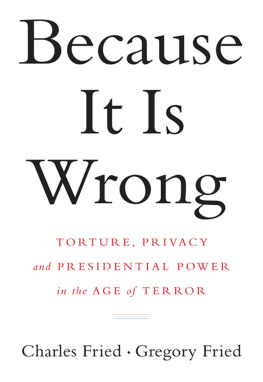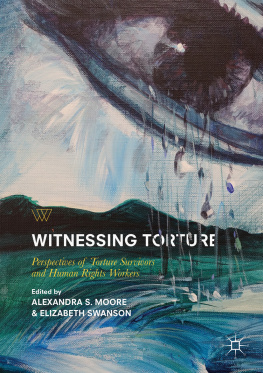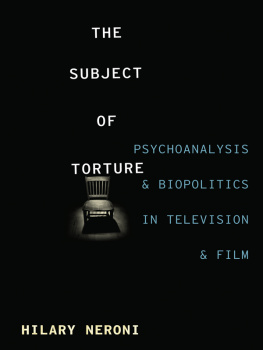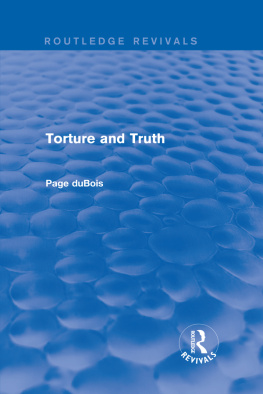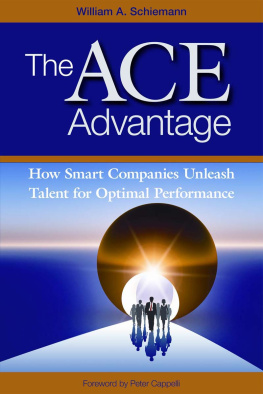Schiemann John W. - Does Torture Work?
Here you can read online Schiemann John W. - Does Torture Work? full text of the book (entire story) in english for free. Download pdf and epub, get meaning, cover and reviews about this ebook. year: 2015, publisher: OxfordUP, genre: Detective and thriller. Description of the work, (preface) as well as reviews are available. Best literature library LitArk.com created for fans of good reading and offers a wide selection of genres:
Romance novel
Science fiction
Adventure
Detective
Science
History
Home and family
Prose
Art
Politics
Computer
Non-fiction
Religion
Business
Children
Humor
Choose a favorite category and find really read worthwhile books. Enjoy immersion in the world of imagination, feel the emotions of the characters or learn something new for yourself, make an fascinating discovery.
- Book:Does Torture Work?
- Author:
- Publisher:OxfordUP
- Genre:
- Year:2015
- Rating:5 / 5
- Favourites:Add to favourites
- Your mark:
- 100
- 1
- 2
- 3
- 4
- 5
Does Torture Work?: summary, description and annotation
We offer to read an annotation, description, summary or preface (depends on what the author of the book "Does Torture Work?" wrote himself). If you haven't found the necessary information about the book — write in the comments, we will try to find it.
Does Torture Work? — read online for free the complete book (whole text) full work
Below is the text of the book, divided by pages. System saving the place of the last page read, allows you to conveniently read the book "Does Torture Work?" online for free, without having to search again every time where you left off. Put a bookmark, and you can go to the page where you finished reading at any time.
Font size:
Interval:
Bookmark:

Does Torture Work?

Oxford University Press is a department of the University of Oxford. It furthers the Universitys objective of excellence in research, scholarship, and education by publishing worldwide.
Oxford New York
Auckland Cape Town Dar es Salaam Hong Kong Karachi Kuala Lumpur Madrid Melbourne Mexico City Nairobi New Delhi Shanghai Taipei Toronto
With offices in
Argentina Austria Brazil Chile Czech Republic France Greece Guatemala Hungary Italy Japan Poland Portugal Singapore South Korea Switzerland Thailand Turkey Ukraine Vietnam
Oxford is a registered trade mark of Oxford University Press in the UK and certain other countries.
Published in the United States of America by
Oxford University Press
198 Madison Avenue, New York, NY 10016
John W. Schiemann 2016
All rights reserved. No part of this publication may be reproduced, stored in a retrieval system, or transmitted, in any form or by any means, without the prior permission in writing of Oxford University Press, or as expressly permitted by law, by license, or under terms agreed with the appropriate reproduction rights organization. Inquiries concerning reproduction outside the scope of the above should be sent to the Rights Department, Oxford University Press, at the address above.
You must not circulate this work in any other form and you must impose this same condition on any acquirer.
Library of Congress Cataloging-in-Publication Data
Schiemann, John W.
Does torture work? / JohnW. Schiemann.
p.cm.
Includes bibliographical references and index.
ISBN 9780190262389 (ebook) 1. Torture. 2. Questioning. 3. Military interrogation. 4. TerrorismPrevention. 5. Crime prevention. I. Title.
HV8593.S345 2016
364.67dc23
2015016041
987654321
Printed in the United States of America
on acid-free paper
To Carol
If we are against torture, we are committed actually to arguing with our fellow citizens, not treating those who defend torture as moral monsters.
MICHAEL IGNATIEFF, Moral Prohibition at a Price, in Torture
The Force of Numbers can be successfully applied, even to those things, which one would imagine are subject to no Rules. [W]hen a Mathematical Reasoning can be had, its as great a folly to make use of any other, as to grope for a thing in the dark, when you have a Candlestanding by you.
JOHN ARBUTHNOT, Of the Laws of Chance
The utility of moral and political philosophy is to be estimated, not so much by the commodities we have by knowing these sciences, as by the calamities we receive by not knowing them.
THOMAS HOBBES, Elements of Philosophy
Does interrogational torture work? What do we mean by work? How good does the information have to be for torture to work? How often must it provide good information to be considered effective? What is the price of this degree of effectiveness? How frequently must torture be used to achieve it? How harsh must the torture be? Will innocent detainees be tortured or only guilty ones?
My goal in this book is to answer these questions. Doing so is vital.
The Bush administration employed interrogational torture because it assumed that it works. Many Americans think it works and can be justified in some circumstances. And if there were another terrorist attack on the United States, such calls would only increase. But if these people are wrong, then we should not torture. We fail to get the information we need, and this is bad in a war against terrorists. Moreover, it means we are engaging in pure sadism. Being tough and pragmatic in defense of the country is American; being sadistic is not very patriotic. Even most people who favor using torture would agree not to use it if they thought it did not work. What is more, we actually make the United States even worse off by spoon-feeding recruitment propaganda to Al Qaeda and other terrorist groups. Bad information and more terrorists mean that more Americans die. On 9/11 I saw the smoke from the World Trade Center from the building where I teach in New Jersey; I understand the impulse to revenge. Revenge may be sweet, but is it worth more innocent lives?
It may be that we would reject interrogational torture even if it did work, as un-American or on other moral grounds. In other words, demonstrating that interrogational torture is effective may not be a sufficient condition to justify its use, but it is surely a necessary condition: If it does not work, then it cannot be justified as an interrogation technique.
Although the questions I raise are old if unsettled ones, the approach I take to answer them is unorthodox. I analyze interrogational torture using a mathematical modeling technique called game theory, though this book contains almost none of the math. Game theory is a type of applied mathematics used to figure out what people (should) do in strategic situations, when what choice you want to make depends on what your opponent does (and vice versa) and what you get in the end depends on everyones choicesnot just yours (true for your opponent too). Detainees and interrogators are in exactly this sort of game, and this makes game theory an applicable, useful, and powerful way of examining it. Another nice thing about game theory is that it sometimes generates some surprising and counterintuitive results. This book is one of those times. I am going to challenge not just conventional wisdom, but also your own intuitions and even basic instincts about torture and interrogations.
There are many decent and reasonable people who do not like the idea of torture but think it is necessary to protect America and Americans from terrorism. If this describes you, then I hope I can convince you that it is worth examining through reason and logic the assumption that torture works. If you are someone who already opposes torture, I hope I am able to convince you why it is necessary not to treat proponents as moral monsters but instead to examine the effectiveness claims of torture proponents. Either way, I hope you will agree that this is a question important enough to take seriously and pursue seriously. Torture is no game.
John W. Schiemann
The idea for this book began with an observation in a paper by Roger Koppl. That paper prompted me to write a journal article published in March 2012 (). In the course of writing that article, I benefited greatly not only from conversations with Roger, but also discussions with Ken Benoit, Bruce Peabody, and Tobias kerlund. Ken kindly invited me to Trinity College, Dublin to present a draft of the paper. Andrew Healy, Roger Koppl, Darius Rejali, David Smailes, Georg Vanberg, Ken Benoit, Rene Lindstdt, Bruce Peabody, Matthew Alexander, and several anonymous reviewers for Political Research Quarterly offered many useful suggestions which found their way into not just the article, but also into the book. Marek Slaby generously provided help with some of the formal mathematical work in the paper, for which Im also grateful. In addition to Tobias, Pierce OReilly, Dinah Y. Olaniyan, Michael Carr, Devon Douglas Bowers, and Kyle Morgan also provided excellent research assistance.
The idea for this book began, as many good ideas tend to do, over good Kentucky bourbon. My wife Carol Rounds, her brother Steve Rounds, and I have a tradition of discussing a book over bourbon when he is in town. While I was still working on the paper, Carol suggested taking my work on torture to a wider audience. This book is a result of their encouragement and support; so if, after reading through to the end, you decide that it could have been a pamphlet, you can blame them.
Next pageFont size:
Interval:
Bookmark:
Similar books «Does Torture Work?»
Look at similar books to Does Torture Work?. We have selected literature similar in name and meaning in the hope of providing readers with more options to find new, interesting, not yet read works.
Discussion, reviews of the book Does Torture Work? and just readers' own opinions. Leave your comments, write what you think about the work, its meaning or the main characters. Specify what exactly you liked and what you didn't like, and why you think so.

